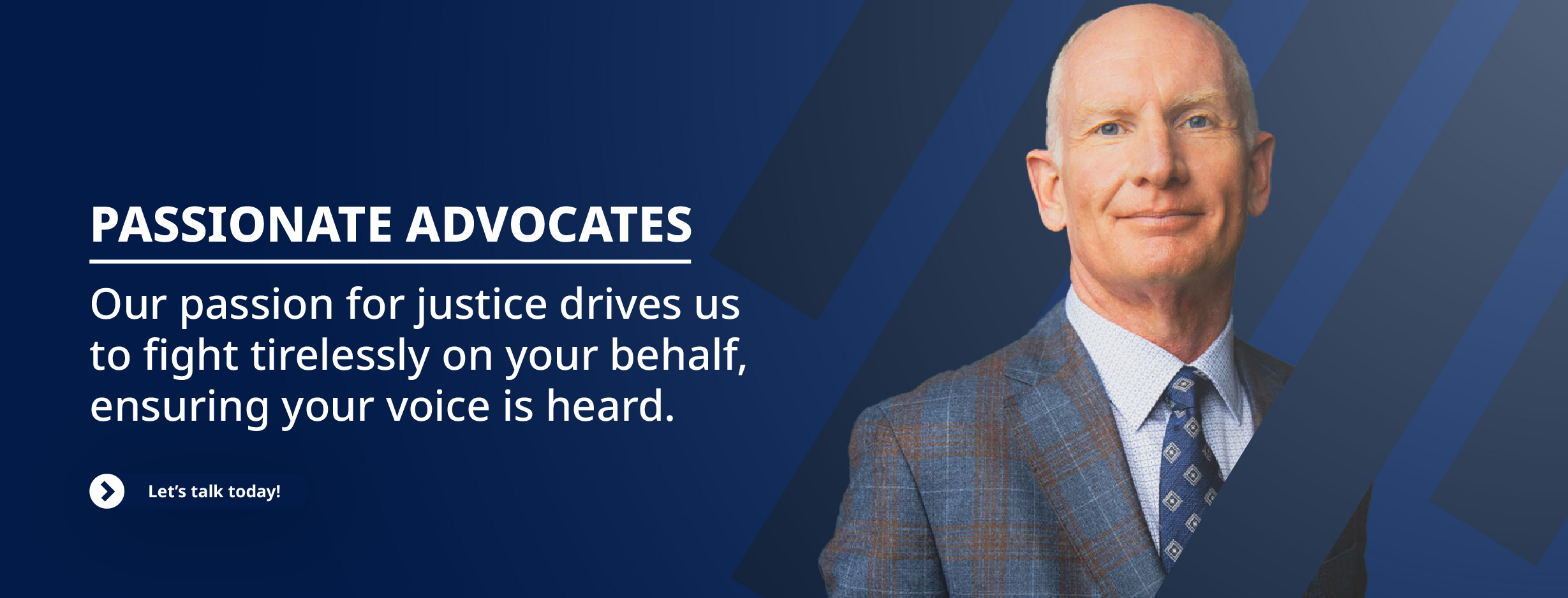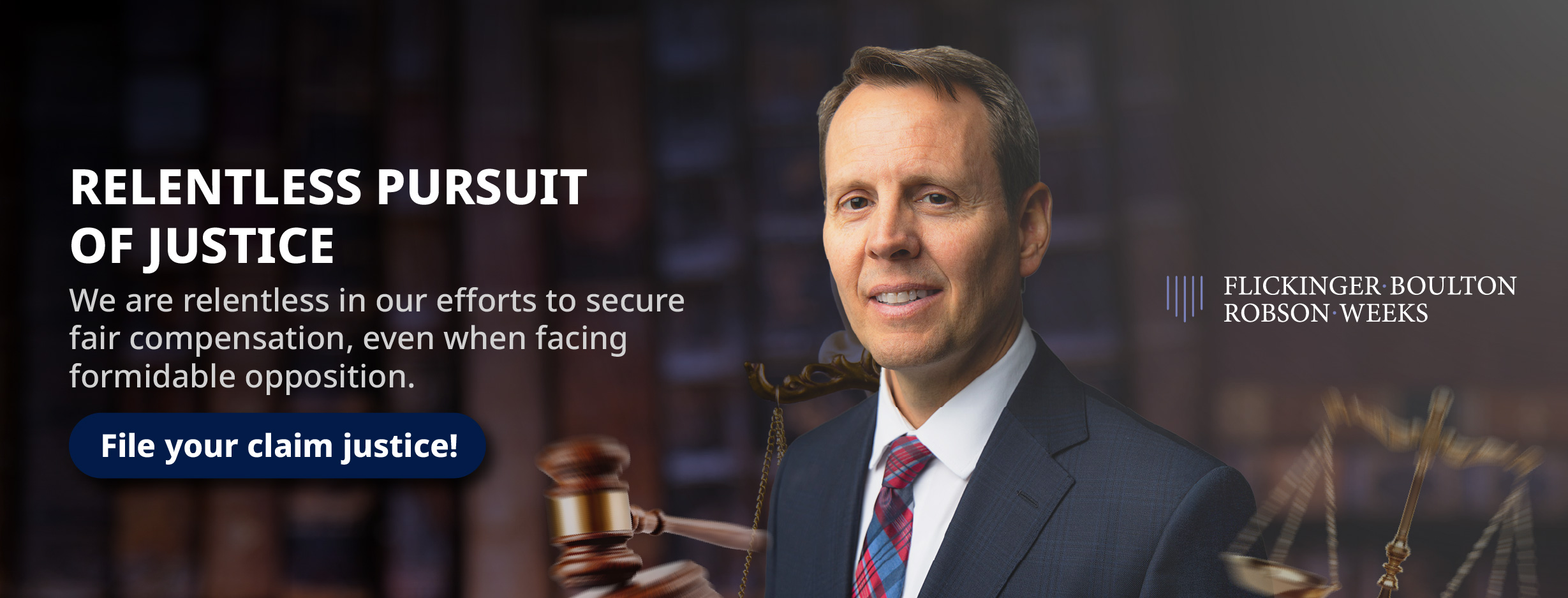¡Hablamos Español!
Truck accidents can cause life-altering injuries, leaving victims facing overwhelming medical expenses, lost wages, and a future filled with uncertainty. When a catastrophic injury occurs, such as a traumatic brain injury, spinal cord damage, or severe burns, it takes more than just medical treatment to recover. You need a strong legal advocate who understands the complexities of truck accident claims and will fight for the compensation you deserve.
At Flickinger Boulton Robson Weeks, our Sandy truck accident lawyers are dedicated to helping victims of serious trucking collisions navigate the legal process. With years of experience handling catastrophic injury cases, we know how to take on trucking companies, insurers, and opposing legal teams to secure the maximum financial recovery.
If you or a loved one has suffered a life-changing injury in a truck accident, don’t wait; reach out to our legal team today to protect your rights and future.
Catastrophic injuries are life-altering conditions that severely impact a victim’s physical and financial well-being. Unlike minor injuries that heal with time, catastrophic injuries often require extensive medical treatment, long-term rehabilitation. They may permanently affect a person’s ability to work or enjoy life as they once did. These injuries frequently result from serious accidents, including truck collisions, workplace incidents, falls from great heights, or violent assaults.
Below are some of the most common types of catastrophic injuries and their long-term consequences.
One of the most severe and complex injuries a person can suffer is a traumatic brain injury. TBIs occur when a sudden impact, jolt, or penetrating object causes damage to the brain. These injuries range from concussions to severe brain damage that impairs cognitive function, memory, motor skills, and even personality.
Many TBI victims experience permanent disabilities that require lifelong medical care, therapy, and assistance with daily activities. In severe cases, a TBI can leave a person in a coma or persistent vegetative state.
Spinal cord injuries are among the most devastating types of catastrophic injuries because they often result in permanent paralysis. Depending on the severity and location of the injury, a person may suffer paraplegia (loss of function in the lower half of the body) or quadriplegia (loss of function in all four limbs).
Even partial spinal damage can lead to chronic pain, reduced mobility, and loss of bladder or bowel control. These injuries require lifelong medical care, home modifications, and expensive mobility aids like wheelchairs and assistive devices.
Third-degree burns are another type of catastrophic injury that can have lasting physical and emotional consequences. Burns destroy layers of skin and underlying tissue, often requiring painful skin grafts, reconstructive surgeries, and ongoing medical care.
In addition to permanent scarring and disfigurement, severe burns can cause nerve damage, mobility restrictions, and a heightened risk of infections. Many burn victims also suffer from post-traumatic stress disorder due to the excruciating pain and emotional trauma associated with their injuries.
Losing a limb is a catastrophic injury that profoundly impacts a person’s ability to perform everyday tasks and maintain independence. Amputations often occur due to traumatic accidents, severe infections, or medical complications following a crush injury.
While prosthetic advancements have improved mobility for amputees, the physical and emotional toll of limb loss is significant. Many individuals struggle with phantom limb pain, depression, and the need for extensive rehabilitation to regain functionality.
Blunt force trauma from car accidents, falls, or workplace incidents can cause internal organ damage that may not be immediately apparent. Injuries to the liver, kidneys, lungs, or heart can be life-threatening and require emergency surgery to prevent fatal complications. Even when a person survives, long-term organ damage may necessitate ongoing treatment, dialysis, or a transplant.
Each of these catastrophic injuries carries lifelong consequences that affect not only the victim but also their families. The financial burden of medical expenses, lost income, and specialized care can be overwhelming.
Seeking legal guidance is crucial for those who have suffered catastrophic injuries due to someone else’s negligence, as they may be entitled to significant compensation to cover their medical costs, lost earnings, and pain and suffering.

When someone suffers a catastrophic injury, their recovery often extends far beyond initial emergency treatment. Unlike minor injuries that heal over weeks or months, devastating injuries such as traumatic brain injuries, spinal cord damage, or amputations require long-term medical care and rehabilitation to help victims regain as much independence and quality of life as possible.
These treatments are often costly, time-intensive, and may last for the rest of a person’s life.
One of the most critical aspects of long-term care for catastrophic injuries is continued medical treatment. Many victims require frequent check-ups, specialized procedures, and monitoring by medical professionals to manage complications and prevent further health deterioration.
Neurologists, orthopedic surgeons, pain management specialists, and physical therapists often play an essential role in the recovery process. Some injuries, such as traumatic brain injuries, require ongoing cognitive therapy to help with memory loss, speech difficulties, and problem-solving skills.
Meanwhile, spinal cord injury patients may need surgical interventions to stabilize their condition, prevent infections, or improve mobility through advanced medical technology.
For many catastrophic injury victims, physical therapy is a crucial part of long-term rehabilitation. Physical therapy aims to improve strength, flexibility, and mobility, allowing the individual to regain as much independence as possible. Those who suffer from spinal cord injuries, severe fractures, or amputations often require extensive rehabilitation to learn how to use assistive devices like prosthetics, wheelchairs, or walkers.
Physical therapy can also help prevent secondary complications, such as muscle atrophy, joint stiffness, and bedsores, which are common in individuals with limited mobility.
While physical therapy focuses on movement and strength, occupational therapy helps patients adapt to everyday tasks after a catastrophic injury. Many victims must relearn how to perform basic activities such as dressing, eating, or using a computer. Occupational therapists assist with adaptive techniques and equipment, such as modified utensils, voice-activated technology, and home modifications to accommodate disabilities.
This type of therapy is essential for those who have suffered brain injuries, amputations, or paralysis, as it helps them regain a sense of independence despite their limitations.
Beyond physical recovery, catastrophic injury victims often struggle with emotional and psychological challenges. The loss of mobility, chronic pain, and drastic lifestyle changes can lead to depression, anxiety, PTSD, and emotional distress.
Many individuals require counseling, therapy, or support groups to help them cope with their new reality. Mental health support is just as important as physical rehabilitation, as emotional well-being plays a significant role in overall recovery.
For some catastrophic injury victims, long-term care may involve hiring home healthcare aides to assist with daily activities, medication management, and transportation to medical appointments. In severe cases, victims may need to live in specialized rehabilitation centers or nursing facilities that offer 24/7 medical support.
These long-term care needs can be extremely expensive, making it crucial for victims to seek compensation through legal action if someone else’s negligence caused their injury.

Catastrophic injuries permanently change a person’s life, making long-term medical care and rehabilitation an essential part of their recovery journey. Without proper medical treatment, physical therapy, psychological support, and financial resources, victims may struggle to regain independence.
If an injury was caused by someone else’s negligence, pursuing compensation through a personal injury claim can help cover these lifelong medical expenses, rehabilitation costs, and home care needs, ensuring that victims receive the support they need for years to come.
When a catastrophic injury occurs, the financial burden can be staggering. Unlike minor injuries that may only require short-term treatment, devastating injuries often lead to lifelong medical expenses, lost earning potential, and extensive rehabilitation costs.
Calculating fair compensation for these damages is complex, requiring a thorough assessment of both economic and non-economic losses to ensure victims receive the financial support they need.
Economic damages cover tangible financial losses related to the injury. These include:
Non-economic damages account for intangible losses that impact the victim’s quality of life, including:
Given the long-term consequences of catastrophic injuries, calculating fair compensation often requires expert testimony, medical evaluations, and financial projections to ensure victims receive the full amount they need to secure their future.

Suffering a catastrophic injury can be one of the most challenging experiences a person faces, leaving them with overwhelming medical needs, financial burdens, and life-altering consequences.
The firm has a proven record of achieving significant verdicts and settlements for its clients, including:
These results reflect the firm’s dedication to fighting for justice and maximizing compensation for injury victims.
At Flickinger Boulton Robson Weeks, we understand the immense physical, emotional, and financial toll that serious injuries impose on victims and their families. Our firm is dedicated to providing compassionate, results-driven legal representation to help our clients secure the compensation and justice they deserve.
Our first priority is understanding the full extent of your injuries and the impact they have on your life. We conduct an in-depth case evaluation, gathering medical records, accident reports, and expert opinions to build a strong legal strategy.
Catastrophic injury cases are complex, often involving large insurance companies, corporations, or negligent parties who will try to minimize their liability. We use our legal expertise to aggressively negotiate on your behalf and ensure that no detail is overlooked in your pursuit of full compensation.
Unlike minor injury claims, catastrophic injury cases require long-term financial planning. We work closely with medical professionals, economists, and life care planners to determine the actual cost of your injury, including:
By presenting compelling evidence of these financial and personal losses, we fight to secure maximum compensation so that you and your family can focus on recovery rather than financial stress.
Many catastrophic injury cases involve large-scale litigation against insurance companies, trucking companies, manufacturers, or negligent individuals. These entities often have teams of lawyers working to undermine or devalue your claim. Our firm has extensive experience handling these complex cases, ensuring that our clients receive a fair settlement or, if necessary, taking the case to trial to fight for their rights.
We know that catastrophic injuries affect every aspect of a person’s life, from physical health to emotional well-being. That’s why we provide personalized legal support, keeping you informed throughout the process and addressing your concerns every step of the way. Our goal is not only to win your case but to give you the peace of mind and support needed to move forward after a life-changing injury.
At Flickinger Boulton Robson Weeks, we stand by our clients from start to finish, ensuring they receive the legal representation they need to secure their future. If you or a loved one has suffered a catastrophic injury, we are here to help.
A catastrophic truck accident can change your life in an instant, leaving you with serious injuries, mounting medical expenses, and uncertainty about your future.
At Flickinger Boulton Robson Weeks, we understand the devastating impact of these accidents and are committed to fighting for the compensation you deserve. Our experienced Sandy truck accident lawyers will stand by your side, handling every aspect of your case so you can focus on your recovery.
With a deep understanding of truck accident claims and a proven track record of success, we are ready to help you secure the financial support needed for long-term care, lost wages, and your overall well-being. Contact us today at (801) 500-4000 for a free consultation and let us help you take the next steps toward justice and recovery.
Bicycle Accidents
Motorcycle Accidents
Boating Accidents
Recreational Vehicle Accidents
Bus and Mass Transit Accidents
Pedestrian Accidents
Automobile Accidents
ATV or UTV Rollovers
Commercial Vehicle Accidents
Semi Truck and Trailer Accidents